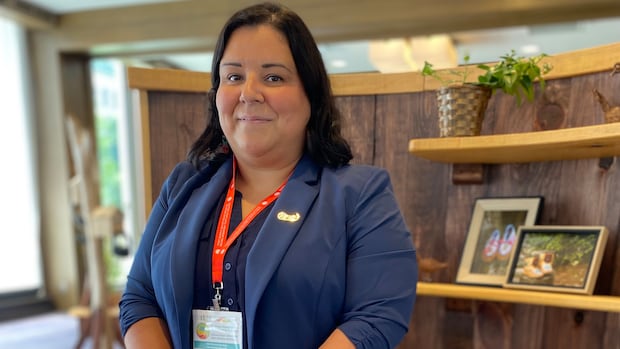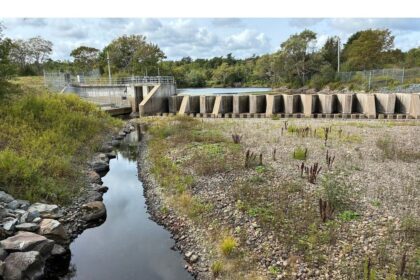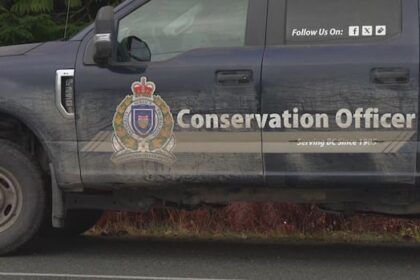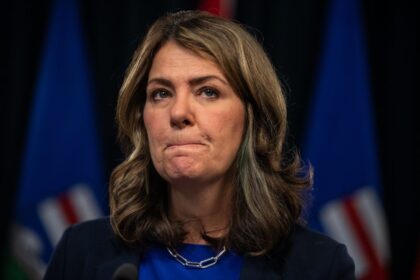MontrealAs the Quebec government continues to promote budgetary rigour, some Native Friendship Centres say they’re struggling to expand their services because funding for their programs has yet to be confirmed. It’s a concern that echoes the findings of an ombudsman report released earlier this month.Native Friendship Centres say they’re struggling to ensure money to expand clinicsFranca G. Mignacca · CBC News · Posted: Nov 17, 2025 4:00 AM EST | Last Updated: 5 hours agoListen to this articleEstimated 5 minutesThe audio version of this article is generated by text-to-speech, a technology based on artificial intelligence.Tanya Sirois, general manager of the Regroupement des centres d’amitié autochtones du Québec, says the province’s current funding model makes it impossible to plan for Indigenous health-care initiatives in the long term. (Shushan Bacon/Radio-Canada)As the Quebec government continues to promote budgetary rigour, a group of Native Friendship Centres in the province says it has yet to get a clear response on whether they will see funding for their Indigenous health clinics renewed.Their concern echoes the findings of a Quebec ombudsman report released earlier this month that said budgetary restrictions could lead to setbacks in implementing the recommendations from the province’s Viens Commission, which looked into the mistreatment of Indigenous people in Quebec — including the calls to action that concern health care.“It was denounced in the Viens Commission, that we’re always obliged to justify the need [for funding],” Tanya Sirois, general manager of the Regroupement des centres d’amitié autochtones du Québec, said in an interview. “At this moment, in 2025, I feel an exasperation on the Quebec government’s part to want to meet its responsibility toward urban Indigenous populations.”Native Friendship Centres in the province have partnered with local health authorities to ensure Indigenous patients gain access to services that take their realities into account and that serve them in the language of their choosing.“Indigenous health clinics offer psychosocial services, physical health services, [medical exams] to prevent illnesses, follow-ups for pregnancies,” said Sirois. But without knowing just how much funding they will receive for the coming year, she says it’s becoming increasingly difficult to plan for staffing in the clinics and to expand their services.“December is right around the corner and there is no money yet that’s made its way [to us] on the ground,” she said. “From April up until now, we have been functioning without funding.” Indigenous issues as ‘flavour of the day’As highlighted in the ombudsman report, funding for Quebec’s five-year J’ai espoir program, which focused on implementing recommendations from the Viens Commission, has come to an end. “Funding of the urban Indigenous health clinics remains uncertain, which threatens the sustainability of the specialized care and support offered to the Indigenous populations living in urban settings,” the report tabled by ombudsman Marc-André Dowd states.Sirois accuses the Quebec government of seeing Indigenous issues as the “flavour of the day,” only increasing funding for programs when tragedies occur. “I was impressed by the adoption of [Bill 32]. It was a big step forward … but we have to keep it in place, we can’t just leave it lying on a shelf,” she said. The law known as Bill 32 went into effect last year and is meant to put cultural safety training and programs in place for Indigenous patients in the health-care system. But the ombudsman report this month found there is no clear strategy in place to implement the new law, nor are there funds attached to it.In a statement, the office of Health Minister Christian Dubé contradicts the Native Friendship Centres’ and ombudsman’s concerns, saying funding is “entirely guaranteed for [2025-26].” Dubé’s office also claims that while the J’ai espoir program may be discontinued, funding for Indigenous health initiatives, including the clinics, has increased.”Quebec maintains, notably, an envelope of $10 million a year over five years to reinforce frontline services,” his office says in the statement. Little progress in 6 years since Viens, advocate saysDerek Montour, president of the First Nations of Quebec and Labrador Health and Social Services Commission, says while there are initiatives geared toward Indigenous health-care services, they are “few and far between.”He said patients also still face issues in accessing interpreters in the language of their choosing when seeking public services. “Obviously there’s been no investment to offer services outside of our communities in our own language, Kanienʼkéha, or another Indigenous language,” Montour said. “Having a grounding and an understanding of Indigenous cultures, I think is a foundational base.” WATCH | Quebec ombudsman tables latest report following Viens Commission:Language barriers in public services still an issue for Indigenous people, finds Quebec ombudsmanQuebec ombudsman, Marc-André Dowd, published an update into the implementation of recommendations from the 2019 Viens report. Dowd warns recent budget cuts could set back efforts to put in place calls to action. Montour said this latest report proves how little progress has been made in the six years since the Viens Commission tabled its report. As for the province’s cultural safety law, Montour says it should have been drafted in collaboration with Indigenous leaders, not merely presented to them for consultation after it had already been written. The ombudsman has recommended the government put in place a detailed multi-year plan outlining clear performance indicators to implement the cultural safety law. He also calls on the Quebec government to work with Indigenous leaders to draft a bill that recognizes the United Nations Declaration on the Rights of Indigenous Peoples (UNDRIP). The Legault government had promised to recognize it during the provincial election campaign in 2018 and later refused to do so out of concern communities would veto economic projects. It’s a measure the Assembly of First Nations Quebec-Labrador (AFNQL) has been calling for for years, and one Chief Francis Verreault Paul says is crucial to ensuring equal access to public services like health care and the right to self-determination. “There’s some principles that are key to UNDRIP, just like the consultation aspect and also the free and informed consent,” said Verreault-Paul. “I think these are really key principles to build a strong relationship between Quebec and First Nations.” ABOUT THE AUTHORFranca G. Mignacca is a journalist at CBC Quebec.
Thursday, 5 Mar 2026
Canada – The Illusion
Search
Have an existing account?
Sign In
© 2022 Foxiz News Network. Ruby Design Company. All Rights Reserved.
You May also Like
- More News:
- history
- Standing Bear Network
- John Gonzalez
- ᐊᔭᐦᑊ ayahp — It happened
- Creation
- Beneath the Water
- Olympic gold medal
- Jim Thorpe
- type O blood
- the bringer of life
- Raven
- Wás’agi
- NoiseCat
- 'Sugarcane'
- The rivers still sing
- ᑲᓂᐸᐏᐟ ᒪᐢᑿ
- ᐅᑳᐤ okâw — We remember
- ᐊᓂᓈᐯᐃᐧᐣ aninâpêwin — Truth
- This is what it means to be human.
- Nokoma










